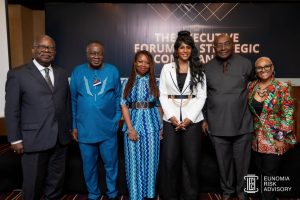
By Afia DRAH
One night in film school, my friends and I found ourselves on the ‘It Takes Two’ set as contestants. For fresh television students, this was incredibly significant. Normally, we were called on set as production assistants or set hands, so being part of the main action was a rare treat.

The set was behind the Lancaster Hotel, formerly known as the Golden Tulip Hotel. My excitement hit a different level when I spotted a man I would later work with on numerous TV projects, commercials and live events: Kwame Sefa-Kayi. Seeing him in person felt like Christmas to me.

But then I heard a sharp, commanding voice cut through the controlled chaos of the television set. I turned, and there she was. Out stepped a ‘tiny’ lady, Brenda Antwi, the director. She was small in stature but commanded complete control of the set. Watching Brenda take charge of the set that night was a revelation.

Even though I had worked at Crystal Television in Kumasi, I didn’t know many female directors in Ghana at the time. Veronica Quarshie was a name I recognised from watching Ghanaian films, but that was it. As an aspiring television producer and director, I hadn’t encountered female television directors up close. Later, I would come to know many female directors, including Shirley Frimpong Manso and Juliet Asante.
Seeing Brenda in action changed everything. She was doing exactly what I aspired to do, and she was doing it with grace, confidence and audacity.

That night, we lost the charades segment to the guys. Let’s just say they deserved the win; they were far more dramatic than we were. But it didn’t matter. What stuck with me was watching Brenda work. She called the shots effortlessly, seated at the control desk. After the shoot wrapped, we had a brief interaction. It’s funny, I can remember faces and names from my 1988 kindergarten class, but I can’t recall the conversation between Brenda and me. Maybe it’s because I was too busy seeing my future self in her.

From NAFTI to the top of Ghanaian TV
Brenda was already making waves while still at NAFTI. In 2003, she won five out of eight awards at the NAFTI Students Awards and took home the Best Fiction Film prize at the ANIWA Festival. Her final student film, ‘Weekend Fever’, was nominated at one of Africa’s biggest film festivals, FESPACO, in 2004. If you know FESPACO, you know how big of a deal it is.

After graduating, she joined Charter House, where she became the creative mind behind some of Ghana’s most popular TV shows and events. If you grew up watching ‘It Takes Two’, ‘Agroooo’ with David Dontoh or ‘Miss Malaika’, you have seen her work. She also produced and directed ‘Stars of the Future’, ‘Malta Guinness Street Dance’ and ‘Kora Search’, which brought Batman (now Samini) into the limelight.
Other notable projects include the ‘Ghana@50’ documentary for Africa Magic on DSTV and Ghana’s biggest music event, the Ghana Music Awards. Brenda defined a generation of Ghanaian television in the early to mid-2000s.
Why don’t we know her name?
“Brenda works tirelessly behind the scenes. She’s a firm and confident leader, but she always keeps her team motivated with a smile,” – Astus Kwesi Ahiable, Senior Television Executive
Despite her impressive track record, Brenda isn’t exactly a household name. Television producers rarely receive the same recognition as on-screen personalities. During her early career, the focus was on promoting the hosts and programmes rather than the people behind them. Brenda’s work was never about the spotlight; it was about creating quality content, and she excelled at it.
“Brenda’s attention to detail and her knack for preparation make her stand out. She never leaves anything to chance, and it shows in her work.” – Afeafa Nfojo, General Manager, Adesa Productions/TV3

A balancing act
Like many women in demanding fields, Brenda faced the challenge of balancing her career aspirations with family life. At the height of her success, she made the difficult decision to step away from the fast-paced television industry to focus on her family, a move that reflects the cultural and societal pressures many women experience. Yet, even in stepping away, Brenda’s commitment to her craft never wavered.
When she returned, she did so with the same determination and drive that had defined her early career. She has showcased her ability to re-establish herself as a leader in Ghanaian television. Brenda’s journey also underscores the importance of work-life integration. She has shown that it is possible to pursue excellence in both personal and professional spheres. Her ability to lead high-profile projects while maintaining a commitment to her family offers valuable lessons for women aspiring to navigate similar paths.
“Once Brenda sets her mind on something, there’s no stopping her. She challenges everyone around her to bring their best. She’s amazing to work with.” – Lakko, GHOne Television.
A legacy worth celebrating
Brenda’s story is one of resilience, demonstrating that taking a break doesn’t mean stepping back permanently; it can be an opportunity to recharge and return stronger. Her work has had a lasting impact on Ghanaian television. She might not be in the headlines, but her influence is undeniable. She has shaped some of the most iconic shows and events in the country’s history, always working quietly behind the scenes.
Currently, Brenda works with the Multimedia Group, producing and directing television, her passion. As Senior Producer and Channel Coordinator for Joy Prime, she oversees ‘Prime Morning’, the lifestyle show ‘CHANGES’, and this season’s ‘Big Chef’ culinary competition. She also leads the male-focused show ‘BMPS’.
Brenda’s story isn’t just about her accomplishments; it’s about paving the way for others. She showed me and many others that women could lead and excel in television. For that, she will always be someone worth celebrating.
The post Brenda Antwi Donkor – the unsung lady behind the most iconic TV productions appeared first on The Business & Financial Times.
Read Full Story














Facebook
Twitter
Pinterest
Instagram
Google+
YouTube
LinkedIn
RSS